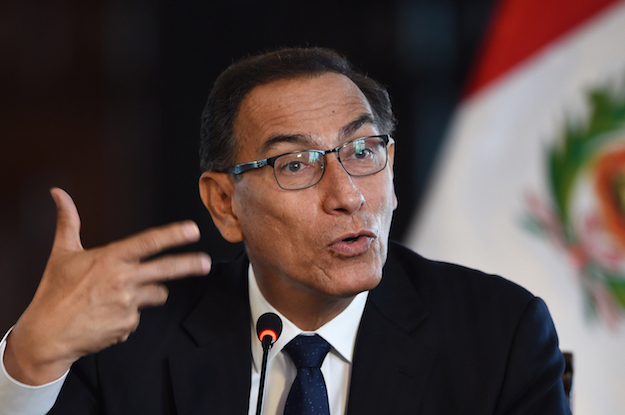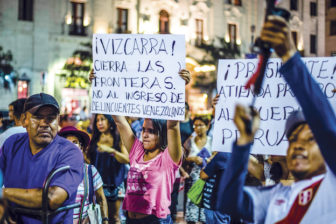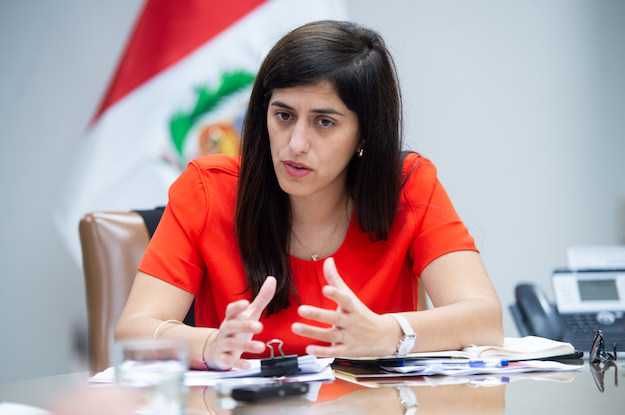LIMA – Martín Vizcarra may have won the most recent battle, but his war with Peru’s deeply unpopular Congress is far from over.
This week, the Peruvian president successfully forced reluctant lawmakers to commit to approving a raft of anti-corruption reforms by forcing a vote of confidence in his cabinet. Had Congress rejected the measure, the president would have had the constitutional authority to dissolve Congress.
However, the future of the reforms – and an end to Vizcarra’s showdown with Congress – is still uncertain: Because Vizcarra’s proposals are constitutional changes, they require lawmakers to approve them one by one before the current session of Congress ends on June 15, and then again in the next session which begins in late July.
The following week will thus be critical to Vizcarra’s ongoing campaign to clean up Peruvian politics, which has led him to clash repeatedly with the country’s 130-member Congress and, in particular, the dominant fujimorista Popular Force party.
The latest flashpoint came when Popular Force and its allies voted last month to shield former Attorney General Pedro Chávarry from prosecution for alleged obstruction of justice. Chávarry is suspected of consorting with organized cime and undermining the Odebrecht investigations.
Then, the fujimorista-led Constitution Commission shelved, within hours and with no debate, Vizcarra’s proposal to have the Supreme Court, rather than Congress itself, decide when to lift a lawmaker’s parliamentary immunity.
In a passionate speech on May 29, the president announced the vote of confidence, accusing “unscrupulous politicians” of forging a “pact of impunity” and “doing everything they can to keep Peru from progressing.”
At face value, Vizcarra’s proposed reforms could go a long way to cleaning up Congress’ image, which has been battered by a never-ending series of criminal accusations against lawmakers. Flagrant cases have included everything from influence-peddling, money laundering and faking high school diplomas to groping an airline stewardess and a former general selling off massive amounts of fuel for military vehicles.
Congress has routinely either flatly rejected lifting members’ parliamentary immunity or has dragged its feet to the point where accused lawmakers have enough time to go on the run once their colleagues finally stop protecting them.
In fact, Congress has only approved five of 47 requests from the judiciary to lift parliamentary immunity since 2007, according to Samuel Rotta, executive director of the Peruvian chapter of Transparency International. In none of those cases was there a political element to the prosecution, the only valid reason for them to have been rejected, Rotta said.
Although in the past those decisions often resulted from a misguided esprit de corps among lawmakers, Rotta said they now seem guided by “political calculus” within Popular Force and its allies seeking to preserve their precarious majority.
Vizcarra’s reforms include a ban on electoral candidates convicted of serious crimes, the criminalization of illegal party funding, compulsory and open internal party elections, gender parity in parties’ electoral lists, and, crucially, a revised version of the proposal to put the Supreme Court in charge of parliamentary immunity.
Nevertheless, it remains unclear whether the reforms will actually become law — or whether Vizcarra may yet feel obliged to call new elections.
The motion of confidence requires Congress to pass the measures — without amendments that would change their essence. Yet Popular Force, and especially its powerful chairwoman of the Constitution Commission, Rosa Bartra, one of the party’s most strident leaders, can be expected to test the limits of Vizcarra’s patience in the coming weeks. The president himself anticipated such antics, warning them against “dirty tricks” as they debate and amend the reforms.
Indeed, the vote of confidence actually split Popular Force, with Bartra among a minority of members who voted against it, possibly in an attempt to call Vizcarra’s bluff. Paradoxically, that aligned them with two small left-wing parties that also rejected the vote of confidence, albeit in their case because they actually support the anti-corruption agenda and also, like an overwhelming majority of Peruvians, would applaud Vizcarra dissolving this congress.
It also remains unclear how effective the reforms will be if they do become law.
“There is no doubt that it would be a step forward for the Supreme Court to be in charge of parliamentary immunity,” said Rotta. “But how sure can we be that those judges also have ethical integrity and are not swayed by political considerations?”
That is a reference to the corruption scandals which have deeply shaken Peru’s justice system recently and which, despite progress — including the resignation of Chávarry as attorney general — have yet to be fully resolved.
Meanwhile, Giovanna Peñaflor, director of pollster Imasen, predicts more turbulence during the remaining two years of Vizcarra’s term, with the threat of a vote of confidence — his principal weapon, along with public opinion, to strong-arm a recalcitrant Congress — becoming less and less effective.
“I don’t think Congress has given up on the idea of impeachment,” Peñaflor told AQ. “We could well lose two more years in a country which cannot spare them.”
The ball is now in Congress’ court. But Vizcarra can also be expected to use the presidential bully pulpit to attempt to stop lawmakers from backsliding. If he succeeds, he just may have taken an important step towards breaking the vicious circle of corrupt politics and democratic illegitimacy that plagues Peru.
—
Tegel is an independent journalist and analyst based in Lima. You can follow him on Twitter at @SimeonTegel.







